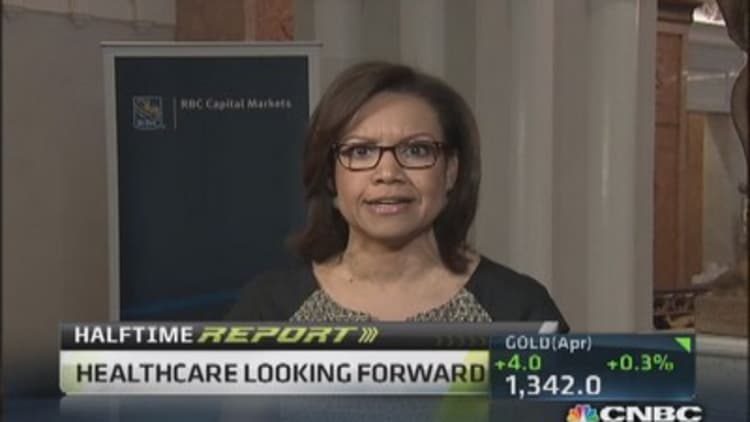Health Republic of New Jersey doesn't have a big budget for advertising, but the upstart insurer has used its nonprofit status as a key selling point in its print ads and grassroots enrollment efforts.
"We're proud of that," said James Martin, Health Republic executive director and CEO. "We found that that message resonates with people: the whole idea of being a cooperative—a consumer-operated and orientated plan—and a not-for-profit committed to innovating in health care."
The insurer is one of three new cooperatives, or co-ops, under the Health Republic brand that launched in 2013, sponsored by the nonprofit Freelancers Union and using federal loans available under the Affordable Care Act.
"We've been granted a considerable amount of solvency dollars to make sure that we're able to cover any of the issues and concerns around utilization so that none of our members would have to be concerned [that we] would be able to cover their hospital bill," explained Martin.
The Obama administration provided $2 billion in guaranteed loans to 24 new co-ops, made available under an Obamacare program to spur greater industry competition and more affordable alternatives to commercial insurers.
(Read more: Meet Oscar: A techie insurer primed for Obamacare )
While all insurers have faced challenges enrolling customers in Obamacare plans, the new co-ops have also faced scrutiny because of the government funding. Critics charge that taxpayers may be left footing the bill for the loans.
One of the two dozen nonprofits granted funding, the Vermont Health Co-op, failed after its state regulators denied approval of the insurer. That has prompted comparisons from some to the administration's 2010 energy loan program, which saw the high-profile default of solar panel maker Solyndra on $535 million in federal loans.
"This is what happens when the government picks winners and losers with the taxpayers' money," said Rep. James Lankford, R-Okla., chairman of the House Oversight and Government Reform subcommittee on energy policy, health care and entitlements.
The committee's Republican staff issued a report ahead of the hearing that raised concerns about the financial viability of the Obamacare co-ops and questioned the legitimacy of the Health Republic co-ops due to their ties to the Freelancers Union.

The report, angered Democrats on the committee, who refused to take part in Feb. 5 hearing, and stormed out after expressing their disdain.
"As much as the majority would like to manufacture a scandal," said Rep. Jackie Speier, D-Calif., "there simply isn't one. There is no smoking gun. This is no Solyndra."
(Read more: Hospital cuts out the middleman and sees success )
Still, Republicans grilled Freelancers Union Executive Director Sara Horowitz about whether her group profited from sponsoring the launch of the three new Health Republic co-ops in Oregon, New York and New Jersey. Combined, the start-ups received $340 million in taxpayer-funded loans.
"We did everything we said we would do to help these co-ops launch successfully and to move them quickly to self-sufficiency. And it worked," said Horowitz, defending her group's role. "When we see the other problems with exchanges—those were problems. We launched on time and on budget."
Back in Newark, N.J., Health Republic's Martin told CNBC that state insurance regulators signed off on Health Republic's launch, finding no improprieties. He chalked up the hearing fireworks to Washington politics.
"I know the number of attempts to derail the Affordable Care Act," he said.
(Read more: Medicare insurer stocks rally on Humana filing )
Now, he is more focused on trying to sign up new members in March, during the last month of open enrollment. He's confident Health Republic will be financially sustainable in the long term, but admits the botched HealthCare.gov rollout has meant a slow start to enrollment.
"We are not seeing the first-time enrollees that was part of our target audience and part of the target segment for the Affordable Care Act. Whether they're the group that's waiting until the end of March—I'm not sure," he said.
Health Republic of New Jersey is not alone. Massachussetts' Minuteman Health has notably struggled, signing up fewer than 600 members in the first four months of enrollment, as the Bay State's Obamacare exchange has been plagued by technical issues.
But a handful of the new co-ops have seen strong numbers in the first few months of open enrollment. Health Republic of New York garnered 16 percent market share on New York's exchange in its first three months, nearly as much as the state's largest commercial insurer Empire Blue Cross. Colorado's HealthOP captured 10 percent of the Centennial State's exchange market, while in Nebraska and Iowa CoOpportunity Health signed up 35,000 people between October and December.
Under Obamacare the co-ops have some time to try to get it right. The plans have five years to repay the initial start-up funding, and up to 15 years to pay back solvency loans.
—By CNBC's Bertha Coombs. Follow her on Twitter @berthacoombs.


